Are you writing about Brussels sprouts or brain surgery?
Blog posts are supposed to be 2,000 words long! insists a participant on one of my webinars.

Excuse me, her colleague interrupts. Pillar posts should be 2,000 words long. Regular posts should be 1,750 words long.
No wonder people are so confused about blog-post length. Research (and you’ll find a collection of it below) argues persuasively that the longer the post, the higher it will rank on search engine results pages, the more readership it will get and the more likely it will be to get shared.
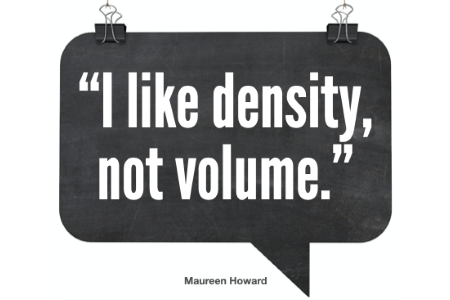
And it’s true. The most robust, insightful, thoroughly researched posts do tend to reap the highest rewards.
But does that mean your post should be 2,000 words long? That depends. Are you writing about rocket science? Or radicchio salad?
Sometimes short posts are best; sometimes the ideal blog post length is longer. The right word length for a blog post depends on the topic. Fortunately, there’s a cool tool that tells you the best length for a blog post on your topic.
How long should your blog post be?
The tool: SEMRush SEO Writing Assistant in Google Docs. (You’ll need a subscription to SEMRush to use it.)
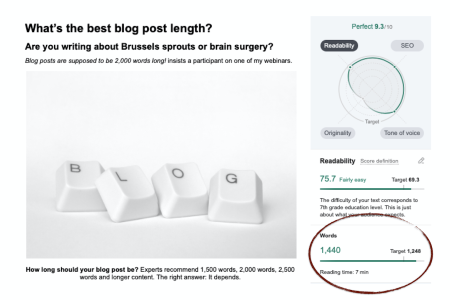
In addition to offering keyword research for your topic, SEMRush Writing Assistant lets you know how long your blog post should be, based on an analysis of the top-ranked blog posts on your topic.
The best length for a blog post on “What’s the best length for a blog post?,” for instance, is 1,121 words. The tool tracks your word count and reading ease and also gives you helpful tips for improving readability.
That said, longer posts in general do tend to perform better.
Why long-form content?
Remember when the perfect article length was 300 words, 500 words, 600 words, 1,000 words long? Turns out long, in-depth blog articles showcase your expertise better, climb higher on search engine results pages, and get shared more often than shorter blog posts.
Whether you’re starting a blog or managing an established one, why write blogs that are longer?
1. Longer blog posts boost search engine optimization.
Google’s clear: Blog content length is not a ranking factor for organic search engine results pages, or SERPs. Google has also said that word count doesn’t indicate the quality of content.
Google does, however, take into consideration backlinks, social shares, social engagement and organic traffic. Longer blog posts deliver all of those metrics. As a result, longer posts rank higher on Google search engine results pages, or SERPs.
Plus, the more words you have, the more longtail keywords and phrases you can include. That increases your chances of showing up higher on search engine results pages.
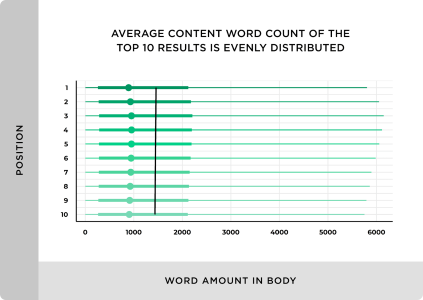
So what’s the best post length for SEO?
- Blog posts that earned Top 10 spots on search results averaged more than 2,000 words, according to research by Capsicum Mediaworks. Of those top posts, the longer posts — up to more than 2,400 words — performed better in search than shorter posts.
- Longer blog posts earn higher rankings on search engine results pages, according to a study by Ahrefs.
- Hubspot’s posts of 2,100 to 2,400 words get the most organic traffic, according to HubSpot’s own analysis.
- The average word count of a Google first page result is 1,447 words, according to a Backlinko analysis.
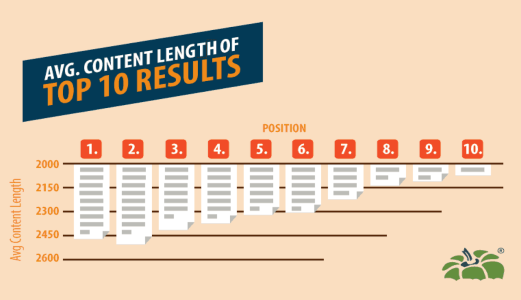
2. Longer blog posts get more links.
Once posts land higher in search results, they get more visits. If those posts offer a great deal of value, visitors might link back to them in their own social media status updates. Those links boost SEO, which boosts visitors, which boost linkbacks.
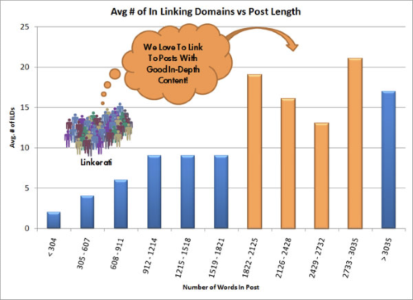
No wonder:
- Posts averaging 1,800 words or more get the most linkbacks, according to research by Moz.
- Long blog posts get more links than short blog posts, according to a study by BuzzSumo and Brian Dean.
Call it The Circle of SEO.
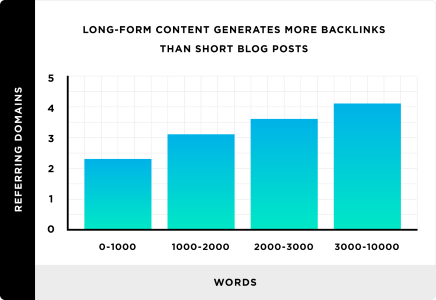
3. Longer blog posts get more shares.
The more information I can use to live my life better you deliver in your blog post, the more people share it.
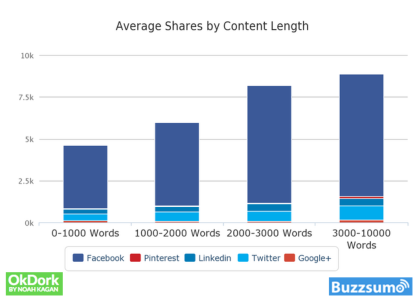
- Posts of 3,000 to 10,000 words get shared many times more often, especially on Facebook, according to research by Aria.
- Longer articles got shared more at one popular online journal, reports Neil Patel. Their posts with more than 1,500 words got 51% more tweets, 66% more Facebook shares and 87% more LinkedIn shares than those under 400 words.
- Patel’s own posts of more than 1,500 words receive 68% more tweets and 22% more Facebook likes than shorter pieces, he reports.

4. Longer posts get read more carefully. Or do they?
Reading may also increase with word count.
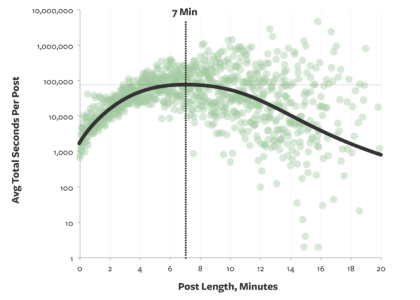
- Time spent on a blog post peaks at 7 minutes, according to Medium. So, Medium suggests, strive for 7-minute posts. How long is that? Figure 7 minutes of reading time at about 200 words per minute for about 1,400 words.
- However, the longer the page, the less of it people read, according to a study by the Nielsen Norman Group. People read about 20% of the words on the page. The longer the page, the smaller percentage of words they read. The solution: Make your long-form blog post scannable.
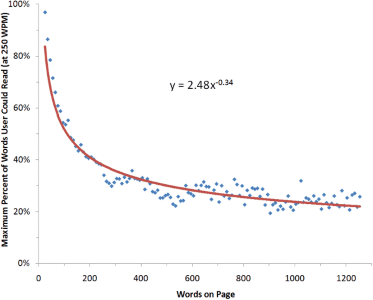
5. Longer blog posts boost your reputation.
“To demonstrate world-class expertise,” Jacob Nielsen writes, “avoid quickly written, shallow postings. Instead, invest your time in thorough, value-added content that attracts” clients and customers.
Want to be seen as the expert in the field? Go deep, not shallow.
What’s the best blog post length?
Whatever the best length for your blog post, don’t just write longer to reach your word count. You won’t get the results you’re looking for with 2,000 words of filler. So pack your post with great research and insight.
As author Maureen Howard said, “I like density, not volume.”
___
Sources: Brian Dean, “We Analyzed 11.8 Million Google Search Results. Here’s What We Learned About SEO,” BackLinko, April 28, 2020
Brian Dean, “We Analyzed 912 Million Blog Posts. Here’s What We Learned About Content Marketing,” BackLinko, Feb. 19, 2019
Kevin Espiritu, “How Important is Content Length? Why Data-Driven SEO Trumps Guru Opinions,” serpIQ, April 26, 2012
Casey Henry, “What Makes a Link Worthy Post – Part 1,” Moz, Oct. 19, 2009
Lindsay Kolowich, “The Character Count Guide for Blog Posts, Videos, Tweets & More,” HubSpot, Oct. 31, 2017
Quincy Larson, “How to write Medium stories people will actually read,” freeCodeCamp (a Medium publication)
Heather Lloyd-Martin, “What’s the ‘Best’ Word Count for Google? [Updated for 2019],” Success Works, Aug. 21, 2019
Paddy Moogan, “How to Generate Content Ideas Using Buzzsumo (and APIs),” Moz, June 3, 2015
Dave Nirav, “How Important is Content Length for SEO & Conversion in 2022 [Infographic],” Capsicum Mediaworks
Jakob Nielsen, “Write Articles, Not Blog Postings,” Nielsen Norman Group, July 9, 2007
Neil Patel, “How Long Should Each Blog Post Be? A Data Driven Answer,” Quick Sprout, March 31, 2014
Mike Sall, “The Optimal Post is 7 Minutes,” Medium, Dec, 2, 2013
Barry Schwartz, “Google: Word Count Is Not A Ranking Factor,” Search Engine Roundtable, Aug. 5, 2019
Matt Southern, “Google: Word Count Does Not Equal Quality Content,” Search Engine Journal, July 25, 2018
Jakob Nielsen, “How Little Do Users Read?,” Nielsen Norman Group, May 5, 2008
Neil Patel, “How Long Should Your Blog Articles Be? (With Word Counts for Every Industry)
”

Leave a Reply